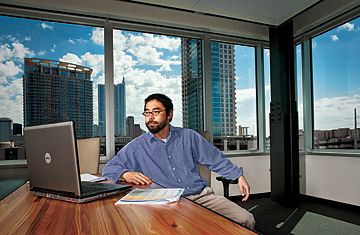
Michael Kim landed his job as HomeAway expands to meet growing demand for its online house-rental service.
(2 of 9)
The great American job-creation machine always has been and will continue to be private enterprise. The problem is that companies are beat-up from the longest economic contraction since the Great Depression. Plenty of economists think the worst is now behind us, but firms are still plagued by uncertainty about how fast the economy will recover. Nor can they plan responsibly without knowing the bottom-line costs of the massive new initiatives out of Washington on health care reform and carbon-emission regulation. Even companies that are financially fit often don't feel like taking the risk of ramping up operations and hiring more workers. There's been political pressure on banks to lend, but the problem for some bankers, like Frost Bank CEO Dick Evans, is that many businesses are debt-shy. "I'm aggressively trying to make loans, but right now they don't want to borrow," he says. "At this point," says Harvard Business School strategy expert Michael Porter, "the No. 1 thing that will create jobs is the perception and confidence that the economy will start growing again."
The good news is the perception as well as the reality is improving in some areas of the country. Just 12 out of 384 metropolitan areas ended 2009 with more jobs than they had at the beginning of the year, but more recently, the numbers have been looking better. Over the past six months (through January), 72 cities gained jobs, according to a Moody's Economy.com analysis of data from the U.S. Bureau of Labor Statistics. That may seem like a slow start, but it's a meaningful one to people being hired in places like Flagstaff, Ariz., Augusta, Ga., and Lansing, Mich.
Austin lands on that list too. The central Texas city of 760,000 has a few built-in advantages over other cities. The University of Texas and the state government--Austin is the capital--provide some economic stability. And as the Southwest's technology center, Austin is home to many high-growth (though high-risk) companies. It is also a music mecca and the gateway to Texas hill country, attributes that help it attract desirable workers. For all these reasons, it hasn't been battered quite as hard as other cities by the recession; the unemployment rate was nearly 3 points below the national average at the end of last year. Still, the metro area has seen big job losses from major employers, including the computer maker Dell and semiconductor manufacturers like Freescale and Advanced Micro Devices. It's not hard to find the desperate stories here that you find throughout the rest of the country: the woman laid off from book publishing two years ago who hasn't been able to find a permanent job since; the interior decorator who used to have a six-figure salary and now sells furniture for $30,000 a year.
